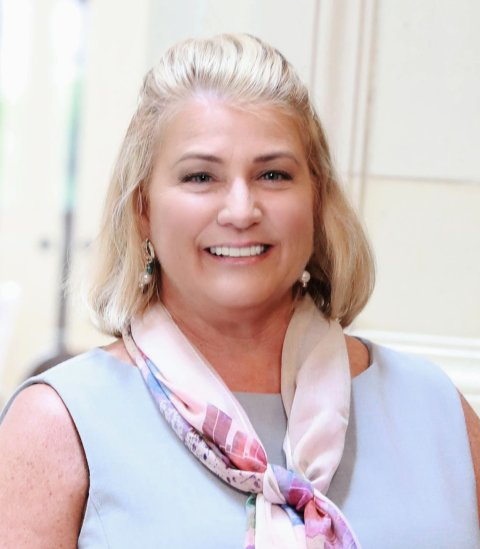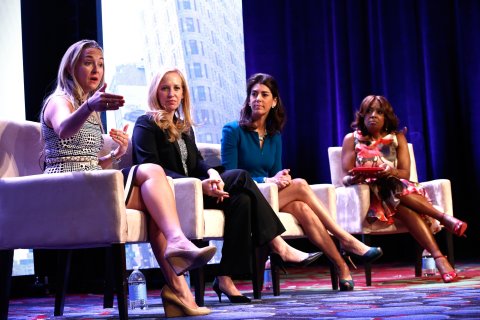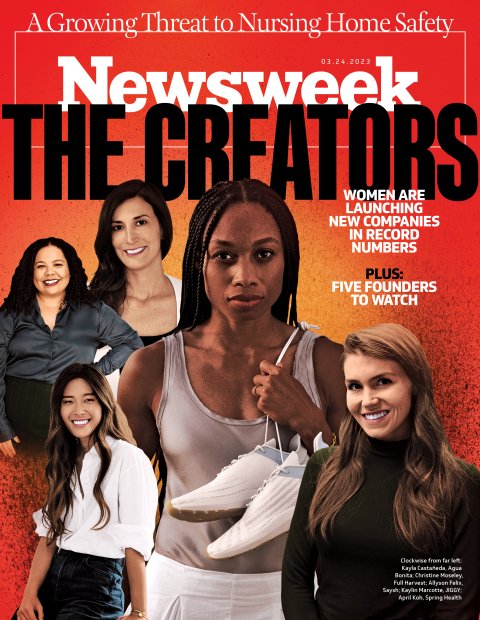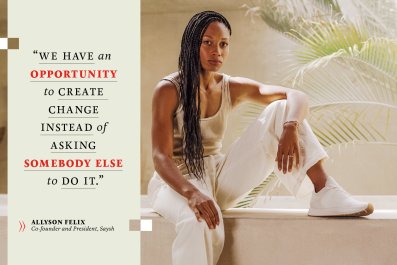When Rihanna paused midway through her Super Bowl halftime performance to wipe the shine from her face with Fenty Beauty blotting powder, it was her flair for business, not her voice, that was momentarily on bold display. That three-second touch up, coupled with the bright lip she sported (Fenty's new Icon Velvet Liquid Lipstick in "MVP" red) and the outfits worn by her backup dancers (from her Savage X Fenty lingerie line, of course), garnered the Fenty brand a cool $7.8 million in the first 12 hours after the game, according to Launchmetrics, which measures the monetary value of media marketing strategies.

Seizing the opportunity, as Rihanna did at the Super Bowl, is what successful entrepreneurs do best. But ingenuity is not the only thing that new company founders increasingly have in common with the Fenty CEO. Since the start of the pandemic, women, particularly women of color, have become the leading drivers of business creation in the U.S. In 2020 and 2021, women accounted for 49 percent of new business launches, according to a study by Gusto, a human resources software company, compared to 42 percent for men in 2021. Meanwhile, nearly half of female-led startups in 2020 were launched by women of color. In 2019, the share of new companies founded by women was just 28 percent.
"We're in a renaissance of entrepreneurship and it is being fueled by groups that have been traditionally left out, like women and people of color," says Luke Pardue, an economist at Gusto who led the study.

What's Driving The Surge
During the pandemic, need and opportunity combined to fuel the explosion of entrepreneurship among women. As COVID-19 gripped the economy, women's labor force participation rate dipped to its lowest level since 1988 as female-dominated industries suffered the worst layoffs and mothers left their jobs to care for children stuck at home thanks to school and daycare closures. For many women, launching a business was the best option available to regain control of their careers and bring in needed income, while maintaining the flexibility to care for loved ones during lockdown.
Read more: Financing for Small Businesses
"We're in a renaissance of entrepreneurship and it is being fueled by groups that have been traditionally left out, like women and people of color."
In fact, the Gusto study found, nearly 40 percent of women who started a new business in 2020 did so as a direct result of the pandemic. Minority women, who were hit hardest by pandemic layoffs, were more than twice as likely as other women to say they'd become an entrepreneur because they were jobless or concerned about their financial situation.
"Women of color felt these disruptions to the greatest degree and have been the ones to turn the greatest obstacles into opportunities for themselves," says Pardue. They were also, he adds, the most likely to start a business aimed at helping their community, particularly through education, health care or nonprofits.
Women also turned to becoming their own employer because they needed more flexible work hours and the ability to determine their own schedule. Nearly three in five female entrepreneurs named this as a top reason they set out on their own in 2020, while more than a quarter of female business owners with school-age children said they launched their company in 2021 because of increased care responsibilities.
"The pandemic was a reset for everyone. It allowed people to take a break from travel, engage with their families and maybe realize they'd been missing out on some things in their personal life," says Pamela Prince-Eason, CEO of the Women's Business Enterprise National Council. "Some, who were working from home and called back, didn't want to return to an office, others liked spending more time at home with their children, and they began to think about how they could keep this flexible model by starting a business of their own."
Broader Support for Female Founders
Women didn't only launch new businesses in response to setbacks in their personal circumstances. Many also took advantage of greater support for women- and minority-owned businesses from corporations, government and nonprofits. For example, several big financial services companies, such as Capital One and Wells Fargo, as well as power technology company Cummins Inc., all launched programs to mentor women founders and entrepreneurs of color, and provide assistance with funding.
Startups led by women have the better bet, returning 78 cents for every dollar invested vs. 31 cents for those founded by men.
The uptick followed intense public pressure to better support people of color in the wake of George Floyd's death. Also a factor: the rising popularity of environmental, social and governance (ESG) investing, which considers non-financial factors, like how a business treats its employees and the larger community and its gender and diversity breakdown, in company evaluations.

"Without a doubt the biggest change occurred after George Floyd's death," says Prince-Eason. "We saw a change in the way corporations were focusing on diversity and inclusion and a real increased desire to learn how to better support women business owners and make it easier for them to operate. It's heartbreaking it took something like that to cause such a change."
PitchBook research analyst Annemarie Donegan agrees that the general social climate in the U.S. has improved for women founders lately thanks to greater interest in equity and ESG considerations—trends that she says have helped businesses and investors acknowledge the obstacles that hold back female companies and spurred more investment. Also helpful, notes Donegan: a sharp increase in the number of female decision-makers at major financial corporations and in venture capital firms—the latter is up 25 percent since 2019—which has helped more women founders gain access to funding. Last year, for example, saw the creation of several women-led angel investment and venture capital firms, along with incubators for female founders.
9 Ways to Grow Your Business
Thinking about launching a venture or looking for ways to build up an existing one? These founders have some advice
01 Show, don't tell.
"If you're selling something the people you're pitching to have never experienced, they may or may not believe you. Every single round, I have made a video showing real users explaining the benefits of our platform and how it works. That's been insanely powerful." ▸ Christine Moseley, founder and CEO, Full Harvest
02 Talk to anyone who will listen.
"I would say yes to everything and anything, talk to hundreds of people, go to every conference, every networking event. I would then go up to these huge panelists right after they spoke and connect with them. Some of those people are what helped me get my business off the ground." ▸ C.M.
03 Build a brain trust.
"Put together a few people who are either other entrepreneurs at the same point as you or ahead—advisers and mentors who can be your support system. It took me many years to figure out how critical it was to have this, so it was a very lonely journey as a solo female founder." ▸ C.M.
04 Become impervious to "no."
"Winston Churchill said: 'Success is going from failure to failure without losing enthusiasm.' That's a great description of what I was like in the early days. [Launching a business] requires a lot of resilience and not giving up." ▸ April Koh, co-founder and CEO, Spring Health
05 Keep improving your pitch.
"Change your pitch after every pitch, based on when you observe people leaning in, when you lose them, the questions they ask. Your deck should be different for every pitch because you're always optimizing and tweaking." ▸ A.K.
06 Be uncompromising in your mission.
"Only 2 percent of venture capital funding goes to women so understand you're going to hear a lot of nos. You can't let that discourage you. Try to really communicate your purpose and your reason—that sticks with people most—because you need to make a lasting impression." ▸ Allyson Felix, co-founder and president, Saysh
07 Read the room.
"Different people care about different things so tailor what you say to the audience. My pitch to investors is not the same as it is to a general audience. Balance your brand story with compelling figures. Having a great story is nice but you need to back up why what you're doing is important." ▸ Kayla Castañeda, founder and CEO, Agua Bonita
08 Cater to your customers' taste.
"You are making products for other people, not for yourself. You might want things a certain way, but if the consensus is saying we want it this way, you have to listen. At the end of the day, we're in the business of making other people happy. Yes, it starts with us, but it ends with them." ▸ K.C.
09 Rely on your own resources as much as you can.
"There is a lot of pressure on new entrepreneurs to secure funding. But there is a lot you can do without fundraising. Try crowdfunding, using Kickstarter, selling preorders. I chose to continue bootstrapping because I didn't want to compromise how we grew the business for the sake of returning someone's money." ▸ Kaylin Marcotte, founder and CEO, JIGGY
"Having female representation at the firm level is half the equation," says Donegan. "Female venture capitalists or angel investors are hugely impactful as pitching to a female investor gives these companies a level of understanding they might not get from traditional venture capitalist firms."
Data shows that women VCs on average invest in twice as many female-founded startups as their male counterparts in the earliest stages of financing.
That's been the case at Inspired Capital, a $500 million-plus generalist fund run by a partnership that is 75 percent female. "VCs have a responsibility to continue to evolve how we evaluate investment opportunities, reducing the implicit biases that have long played a role in early-stage funding decisions when so much of what you're assessing is the founder," says Alexa von Tobel, Inspired Capital's founder and managing partner. "By continuing to showcase more female investors and founders who are building exceptional companies, more will follow."
The broader support from various quarters appears to be paying off. A 2022 Pitchbook study found that through the first nine months of 2021, startups with a female founder raised more than $40 billion, nearly twice the amount raised by companies started by women in all of 2019 or 2020.
Money Troubles Remain
The greater dollar amounts flowing to women founders, though, is also partly a function of massive growth in venture capital funding overall in recent years. Measured as a percentage of total VC money invested, the share going to women-led firms has actually remained stagnant, plateauing at between 2 and 3 percent, including 2.1 percent in 2022. Businesses co-founded by a man and a woman have done somewhat better, garnering 16 percent of all venture capital funding last year—a new record that reflects slow but steady growth of late.
The net result is that about 80 percent of VC funding still goes to all-male enterprises. That's despite research from Boston Consulting Group (BCG) that found startups led by women were the better bet, returning 78 cents for every dollar invested vs. 31 cents for those founded by men.
"Access to capital remains the biggest issue for women business owners, and it's even worse for women of color," says Prince-Eason.
Read more: Best Business Grants for Women
Part of the problem is that women tend to face more pushback during pitches, especially regarding their technical expertise, BCG found. Female founders usually also provide more realistic financial projections, meaning they may ask for less money than male founders and drum up less excitement among VC investors looking for the next big payout.
Even the growth in the number of female angel investors and women at VC firms hasn't moved the needle as much as expected because of a curious catch-22. A study published last month in the Harvard Business Review found that women-led firms whose first round of funding was raised exclusively from female VC partners were two times less likely than those whose first round included male partners to raise a second round. Conversely, the gender of initial investors for companies founded by men had no impact on subsequent financing.

"When people see that a female founder has a male investor, they assume she must have received his investment because she is competent, and her startup is strong," wrote authors Isabelle Solal, an assistant professor of management at ESSEC Business School, and Kaisa Snellman, an associate professor of organizational behavior at INSEAD. "But when people see that a female founder has a female investor, they attribute her investment success to her gender rather than her competence...regardless of her actual qualifications."
Forging Ahead
Infuriating? Sure. But the challenges that women still face in starting a business hasn't stopped the growing number who are trying. As Olympic track and field champion Allyson Felix, founder of the women's footwear brand Saysh, says, "You're going to hear a lot of nos and you can't let that discourage you or get in your way."
In the end, says Kaylin Marcotte, founder of the puzzle company JIGGY, "Making that switch from employee to entrepreneur is ultimately a bet on yourself." In today's uncertain economy, if you have a smart idea for a new business and it's your dream to launch it, there is, perhaps, no better bet to make.












